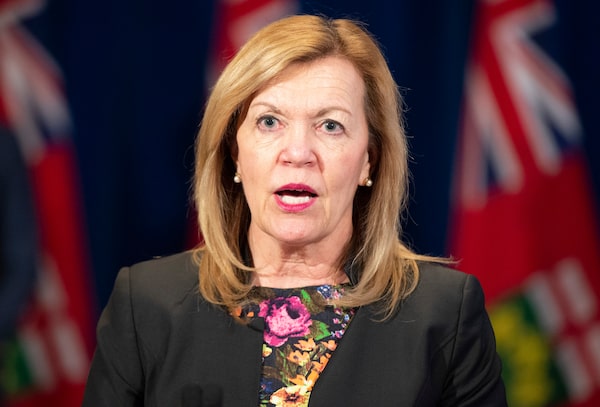
Ontario Health Minister Christine Elliott, seen here on April 28, 2020, cited a study that she said found up to 35 people awaiting cardiac surgery may have died because their procedures were not performed during the pandemic.Frank Gunn/The Canadian Press
Ontario Health Minister Christine Elliott says cancer and cardiac operations will take priority once restrictions on hospitals are lifted, as a report from the province’s fiscal watchdog revealed almost 53,000 procedures have been cancelled or delayed since mid-March as a result of COVID-19.
Ms. Elliott cited a study that she said found up to 35 people awaiting cardiac surgery may have died because their procedures were not performed during the pandemic.
But she said Ontario saved thousands of lives by enacting emergency measures to limit the spread of the novel coronavirus that had the potential to severely overwhelm the health care system.
“We wanted to make sure we protected as many people as possible. There may be some people who died because of cardiac or cancer deaths, but we also saved thousands of lives by moving as quickly as we did,” she said at a news conference on Tuesday.
“I know that it’s been very disturbing for many people who want to get on with their surgery. But again, we can’t do it until we know that the peak has plateaued."
Her office later said the study she cited analyzed historical data to estimate how many people scheduled to have a cardiac procedure may have been affected by COVID-19 delays. “To be clear, the study does not report on confirmed cases or individuals known to have been impacted,” spokeswoman Hayley Chazan said.
A report released Tuesday from Ontario’s Financial Accountability Office estimated that Ontario has cancelled or avoided as many as 52,700 hospital procedures and up to 12,200 procedures will be delayed for every week that the province’s hospitals continue to postpone elective surgery. Ontario postponed the operations to make room for a tsunami of COVID-19 patients that, so far, has not materialized.
The FAO found that as of April 23, there were approximately 9,345 empty acute-care beds and 2,191 empty critical care beds across the province’s 141 hospitals, meaning most of the extra space created for COVID-19 patients was going unused.
“So far, we’ve been skillful or lucky or probably a bit of both that we haven’t had a hospital situation like Italy has had,” said Peter Weltman, Ontario’s financial accountability officer. “What does that tell us about the future? Not very much. There are still a lot of unknowns in terms of how many cases there are out there.”
As of April 23, there were 910 patients with COVID-19 in hospital, 243 of whom were in the intensive-care unit, the report found.
The FAO noted that the total number of COVID-19 patients in Ontario hospitals dropped from April 17 to April 19, but began increasing again on April 20, likely because of the severe outbreaks that have ravaged dozens of seniors’ homes. The number of patients in the ICU has held steady or dropped slightly.
The most recent figures from the Ontario Ministry of Health show that, as of Monday, there were 957 patients in hospital with COVID-19, 239 of whom were in the ICU.
Before the coronavirus upended Ontario’s health care system, hospitals were bursting at the seams. Provincewide, they averaged occupancy rates of 96 per cent, with 28 hospitals exceeding 100-per-cent occupancy most of the time in 2018-19.
The provincial government created swaths of extra space by cancelling elective surgery, moving about 1,000 patients out of hospital and expanding funding for new beds.
The FAO projected that health sector spending would increase by 5.4 per cent in 2020-21, the largest year-over-year increase in more than a decade. That figure includes $2.1-billion for the COVID-19 response.
The report found that if Ontario’s state of emergency measures announced on March 17 had been implemented five days later, the number of critical care COVID-19 patients would have been more than four times greater than it is.
NDP Leader Andrea Horwath said the province should cover 100 per cent of the cost of take-home cancer drugs for patients whose in-hospital treatments have been put on hold.
Our Morning Update and Evening Update newsletters are written by Globe editors, giving you a concise summary of the day’s most important headlines. Sign up today.
 Laura Stone
Laura Stone Kelly Grant
Kelly Grant